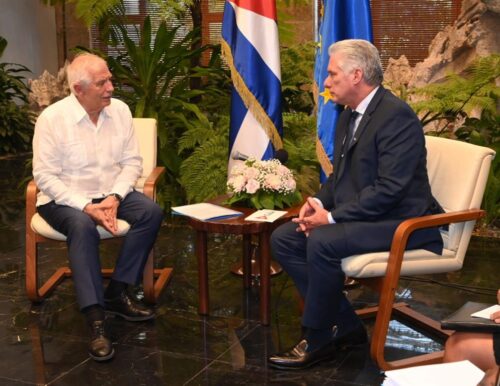The High Representative for European Foreign Policy criticizes the US embargo and the inclusion of the island in the list of countries sponsoring terrorism
The High Representative for Foreign Policy of the EU, Josep Borrell, reiterated this Friday in Havana his strategic commitment to maintain an active presence on the island and advance in cooperation and high-level bilateral dialogue as the best mechanisms to contribute to changes in Cuba, in the face of the US embargo policy. After concluding the third Joint Council, held as part of the Political Dialogue and Cooperation Agreement between Cuba and the European Union, Borrell announced for the end of November the “important” visit of the EU special representative for Human Rights, Eamon Gilmore, one of the concrete results of his trip, which, he said, marks “the beginning of a new cycle of dialogues” between Brussels and Havana.
“We cannot ignore that we have differences on various issues […], but the European Union has neither the capacity nor the will to impose changes on Cuba, but we do want to have a framework of dialogue that allows us to talk about everything that unites us and differentiates us without taboos or prohibitions,” said the head of European diplomacy, clearly betting on the “constructive” and at the same time “critical” commitment to Cuba, as opposed to Washington’s policy of pressure. He even mentioned the speech given in Havana by former U.S. President Barack Obama during his historic visit to the island in 2016 and quoted his words: “The embargo hurts the Cuban people and does not help produce the political changes that are intended.”
“Obama said it and I think so too,” Borrell said, recalling that the EU votes as a bloc every year at the UN against the embargo policy. He also criticized the inclusion of Cuba in the list of countries sponsoring terrorism by Donald Trump, from which the Biden administration has not removed it, something that, he said, “is causing serious and unfair problems to the development of economic activities on the island.” The embargo, he said, “hinders the living conditions of Cubans and undermines the necessary process of reform and modernization.”
Support for Cuban positions on this issue, key for the Government of Havana, was combined by Borrell with a fiery defense of the democratic values of the EU and its conception of human rights, in which obviously the differences with Cuba are many. The EU High Representative for Foreign Policy referred to civil liberties and the right to demonstrate, saying that in talks with his counterparts he addressed the issue of “the situation created before, during and after” the mass protests of 11 July 2021, after which hundreds of people were arrested and sentenced. “That’s what Eamon Gilmore will talk about when he comes to have a human rights dialogue in November,” he said. Within the “respectful” dialogue with Cuba, Borrell mentioned another of the “differences” that separate him from Havana, the war in Ukraine, requesting Cuba’s support now that the island presides over the important Group of 77 and China “and has a special responsibility in the multilateral sphere.”
For the EU it is important to explain its vision of the conflict, he said, because the community bloc hopes to “count” on Cuba to “promote respect” for the “sovereignty of Ukraine.” Since the beginning of the war, the Cuban government has avoided talking about an invasion and has supported the position that the US and NATO played a key role in the origin of the conflict, subscribing to Russian positions, although abstaining in the UN votes on most of the resolutions promoted by Moscow. In that sense, the Deputy Minister of Foreign Affairs of Cuba, Anayansi Rodríguez, who accompanied Borrell after the bilateral meeting, defended that her country advocates “a serious diplomatic solution” and opposes sanctions against Russia. He also said “that history will demand accountability” from the United States for its “military doctrine outside NATO’s borders.”
Borrell, who during his stay on the island held meetings with Cuban President Miguel Díaz-Canel and Prime Minister Manuel Marrero, on Friday again supported the more than 700 European companies working on the island in the current moments of serious crisis, and supported with emphasis the emerging private sector and new Cuban small and medium-sized companies. which, he observed, “are growing at a very rapid rate since their creation was authorized.” The objective of the EU, he said, “is to help develop their capacities so that they become key factors in the economic and social development of Cuba, as they are in Europe,” offering to “accompany” Cuba in its “process of economic and social reforms from a relationship of mutual respect, which has no other objective than to contribute to improving the lives of Cuban citizens.” (https://elpais.com/internacional/2023-05-26/borrell-defiende-en-cuba-la-presencia-activa-de-la-union-europea-y-su-agenda-de-los-derechos-humanos.html)



































